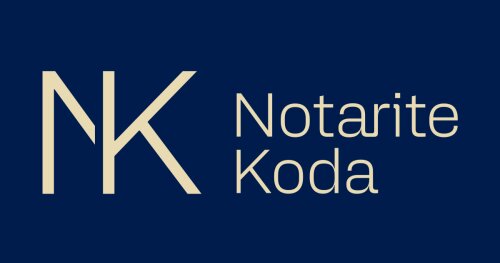Best Collaborative Law Lawyers in Paide
Share your needs with us, get contacted by law firms.
Free. Takes 2 min.
Free Guide to Hiring a Family Lawyer
List of the best lawyers in Paide, Estonia
About Collaborative Law in Paide, Estonia
Collaborative Law is an alternative dispute resolution method that allows individuals to resolve legal matters amicably without resorting to the court system. In Paide, Estonia, Collaborative Law is gaining popularity, especially in family disputes such as divorce, child custody, and property division. It encourages open communication, transparency, and cooperation between parties. Instead of adopting a confrontational approach, both parties work with their lawyers and often other professionals such as financial advisors or psychologists to reach a mutually beneficial agreement. This process is confidential, voluntary, and specifically tailored to meet the individual needs of the parties involved.
Why You May Need a Lawyer
There are several situations where seeking legal advice or representation in Collaborative Law may be necessary. Common scenarios include:
- Divorce or separation, where both parties want to avoid litigation and maintain respectful relations.
- Child custody and visitation arrangements that require creative or flexible solutions.
- Division of marital assets and financial settlements where transparency and fairness are prioritized.
- Drafting or modifying prenuptial or postnuptial agreements cooperatively.
- Business disputes between partners or family members who wish to continue their professional relationship after resolution.
- Inheritance and succession disputes where maintaining family harmony is essential.
- Workplace conflicts, especially in small businesses or local organizations, where ongoing relationships matter.
A lawyer trained in Collaborative Law in Paide can guide you through the process, ensure your legal rights are protected, and help facilitate constructive negotiations.
Local Laws Overview
Collaborative Law in Paide, Estonia, is guided by general Estonian legal principles along with specific protocols adopted by practitioners of this method. Key aspects include:
- Voluntary Participation: All parties must agree to resolve their dispute collaboratively and sign a participation agreement.
- No Court Involvement: During the collaborative process, litigation is paused, and all parties agree not to threaten or initiate court proceedings.
- Confidentiality: Discussions and documents exchanged during the process remain confidential and cannot be used in later court proceedings if negotiations break down.
- Full Disclosure: Both parties must share all relevant information openly and honestly to foster trust and effective negotiation.
- Withdrawal Clause: If the process fails, the lawyers must withdraw from the case and cannot represent their clients in subsequent litigation regarding the same matter.
- Legal Framework: Collaborative Law operates within Estonian civil procedure and family law codes, with an increasing number of legal professionals in Paide adopting collaborative techniques.
These protocols ensure the process remains fair, transparent, and distinctly different from traditional adversarial litigation.
Frequently Asked Questions
What is Collaborative Law?
Collaborative Law is a legal process where parties resolve disputes without going to court, focusing on cooperation, problem solving, and open communication with the help of specially trained lawyers.
How does Collaborative Law differ from mediation?
In Collaborative Law, both parties have their own lawyers present throughout the negotiations to protect their interests, while mediators are neutral third parties without client advocacy roles.
Is Collaborative Law only for family law disputes?
No, although it is most commonly used in family law, Collaborative Law can be applied to business, inheritance, and employment disputes where ongoing relationships are valued.
What happens if one party wants to go to court?
If either party decides to initiate court proceedings during the process, the collaborative process ends, and both lawyers must withdraw from representing their clients in litigation about the same issue.
Are agreements reached in Collaborative Law legally binding?
Yes, agreements reached are formalized in writing and can be submitted to the court for approval, making them legally binding and enforceable under Estonian law.
How long does the Collaborative Law process usually take?
The duration varies depending on the complexity of the issues but is generally quicker than traditional court cases, often concluding in several weeks to a few months.
What are the costs associated with Collaborative Law?
Costs depend on the number of professionals involved and the length of negotiations, but collaborative law often results in lower overall expenses compared to litigation due to its efficiency and focus on settlement.
Do children ever take part in Collaborative Law sessions?
Children themselves do not usually participate, but their interests are represented through child specialists or by bringing in professionals to provide advice on parenting plans.
Can I use Collaborative Law if there is a significant power imbalance between parties?
Collaborative Law is designed to be fair, but if a significant imbalance exists, additional safeguards or the involvement of neutral professionals can help; in severe cases, traditional court proceedings may be recommended.
How do I find a Collaborative Law lawyer in Paide?
Look for lawyers who belong to organizations promoting Collaborative Law or seek recommendations from the Estonian Bar Association or your local legal aid office in Paide.
Additional Resources
If you are seeking more information or support related to Collaborative Law in Paide, Estonia, consider these resources:
- Estonian Bar Association - provides listings of qualified collaborative lawyers.
- Estonian Family Mediation Association - information and referrals for mediation and collaborative processes.
- Järva County Legal Aid Offices - offering legal advice and representation to residents of Paide and surrounding areas.
- Estonian Ministry of Justice - updated legal information and legislative developments.
- Paide Municipality Social Services - guidance for family and child-related disputes.
Next Steps
If you believe Collaborative Law may be suitable for your situation, consider these steps:
- Reflect on your goals for resolving the dispute and discuss them with the other party if possible.
- Research and contact lawyers in Paide who specialize in Collaborative Law to arrange an initial consultation.
- Prepare relevant documents and information for your meetings to help the process proceed smoothly.
- Ask questions about the Collaborative Law process and ensure you are comfortable with the lawyer’s approach.
- Sign a collaborative participation agreement if all parties agree to begin the process.
- Stay committed to open and honest communication throughout negotiations.
Collaborative Law offers a respectful and constructive way to resolve disputes. Professional guidance can help you achieve fair and lasting outcomes tailored to your unique needs.
Lawzana helps you find the best lawyers and law firms in Paide through a curated and pre-screened list of qualified legal professionals. Our platform offers rankings and detailed profiles of attorneys and law firms, allowing you to compare based on practice areas, including Collaborative Law, experience, and client feedback.
Each profile includes a description of the firm's areas of practice, client reviews, team members and partners, year of establishment, spoken languages, office locations, contact information, social media presence, and any published articles or resources. Most firms on our platform speak English and are experienced in both local and international legal matters.
Get a quote from top-rated law firms in Paide, Estonia — quickly, securely, and without unnecessary hassle.
Disclaimer:
The information provided on this page is for general informational purposes only and does not constitute legal advice. While we strive to ensure the accuracy and relevance of the content, legal information may change over time, and interpretations of the law can vary. You should always consult with a qualified legal professional for advice specific to your situation.
We disclaim all liability for actions taken or not taken based on the content of this page. If you believe any information is incorrect or outdated, please contact us, and we will review and update it where appropriate.









